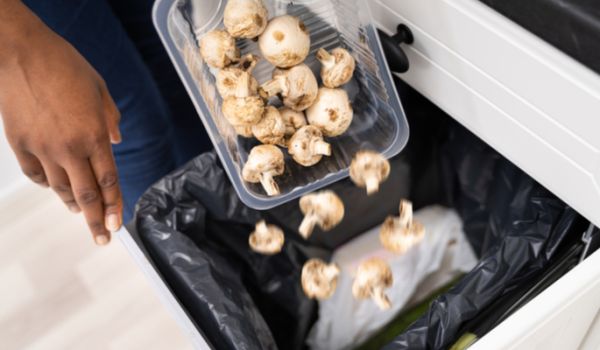Capitalising on COVID-19 as a Trigger for Positive Change in Food Waste Behaviour
- Centre for Decision Research

The COVID-19 lockdowns have caused big changes in people’s daily lives. Although there have been a lot of new challenges people have had to face, there have been some advantageous outcomes too, such as a positive change in consumers’ food waste-related behaviours.
Household food waste is an acknowledged societal problem, contributing to greenhouse gas production, food insecurity, and food price inflation. When food is wasted, not only are consumers wasting their money, but there is a huge negative impact on the environment. Growing, transporting, refrigerating and packaging food all uses large amounts of energy and associated carbon emissions, and when we send wasted food to landfill this causes more harmful emissions.
During the first lockdown in 2020, self-reported levels of food waste in the UK fell by 34% - the sharpest fall on record. UK consumers reported an increased awareness and willingness to minimise household food waste leading to a reduction across four key products (bread, milk, potatoes, and chicken) compared to the average across 2018-2019.
While the changes seen during the COVID-19 lockdown are promising, previous research shows that behaviour change resulting from temporary contextual changes may not last long. Data from the Waste & Resources Action Programme (WRAP) shows that levels of reported food waste began to rebound after the first national lockdown, with an increase of 31% compared to lockdown figures (although it still remained below the levels seen pre-lockdown).
Our research project - Capitalising on COVID-19 as a Trigger for Positive Change in Food Waste Behaviour - aims to harness the positive changes in food waste behaviour and investigate opportunities to sustain this change over the long-term. Working with WRAP and Zero Waste Scotland, and funded by the Economic and Social Research Council (ESRC) as part of UK Research and Innovation’s rapid response to Covid-19, we will investigate the causal factors underpinning the positive change and trial interventions to capitalise on them.
We are particularly interested in the determinants of behaviour such as values, goals, and emotions. For instance, what impact does the goal of eating healthy food or the goal of protecting the environment have on wasting food? Similarly, how does feeling guilty about wasting food affect how we buy and eat food?
The project will develop interventions to help households waste less food. To support this, around 1,500 people from across the UK will take part in a survey looking at how they choose, store, manage and cook food. Approximately 30 people will also take part in more detailed interviews and later be asked to keep household diaries of food waste.
We will be sharing our findings with food waste organisations, retailers, policymakers and the general public, to ensure that interventions can be rolled out across the UK with immediate effect. This should result in positive social and economic impacts on food insecurity, consumers’ cost savings, food price inflation, and the environmental impact of reducing carbon emissions.
This project is funded by the Economic and Social Research Council (ESRC), as part of UK Research and Innovation’s rapid response to Covid-19.

Contact us
If you would like to get in touch regarding any of these blog entries, or are interested in contributing to the blog, please contact:
Email: research.lubs@leeds.ac.ukPhone: +44 (0)113 343 8754
Click here to view our privacy statement. You can repost this blog article, following the terms listed under the Creative Commons Attribution-NonCommercial-NoDerivatives 4.0 International licence.
The views expressed in this article are those of the author and may not reflect the views of Leeds University Business School or the University of Leeds.

